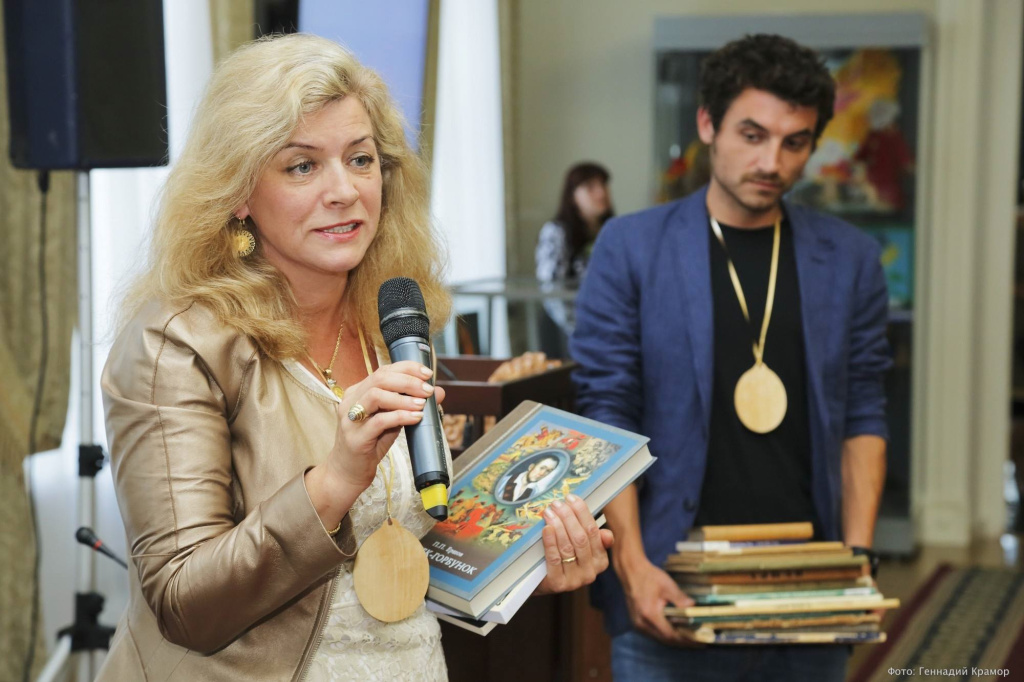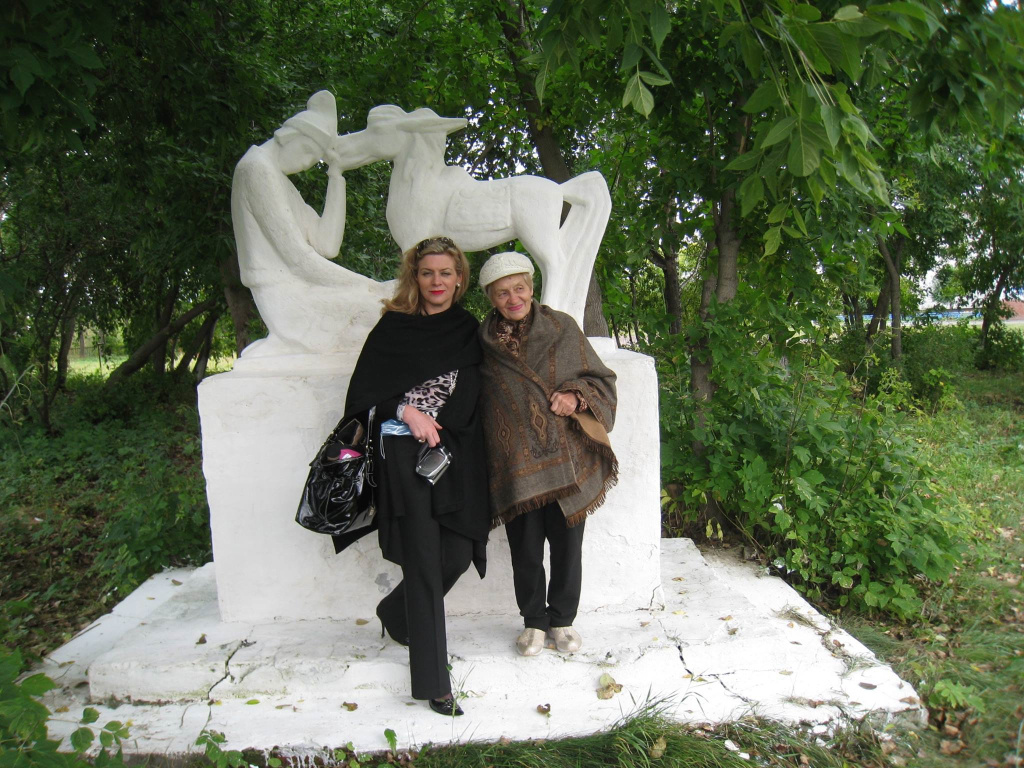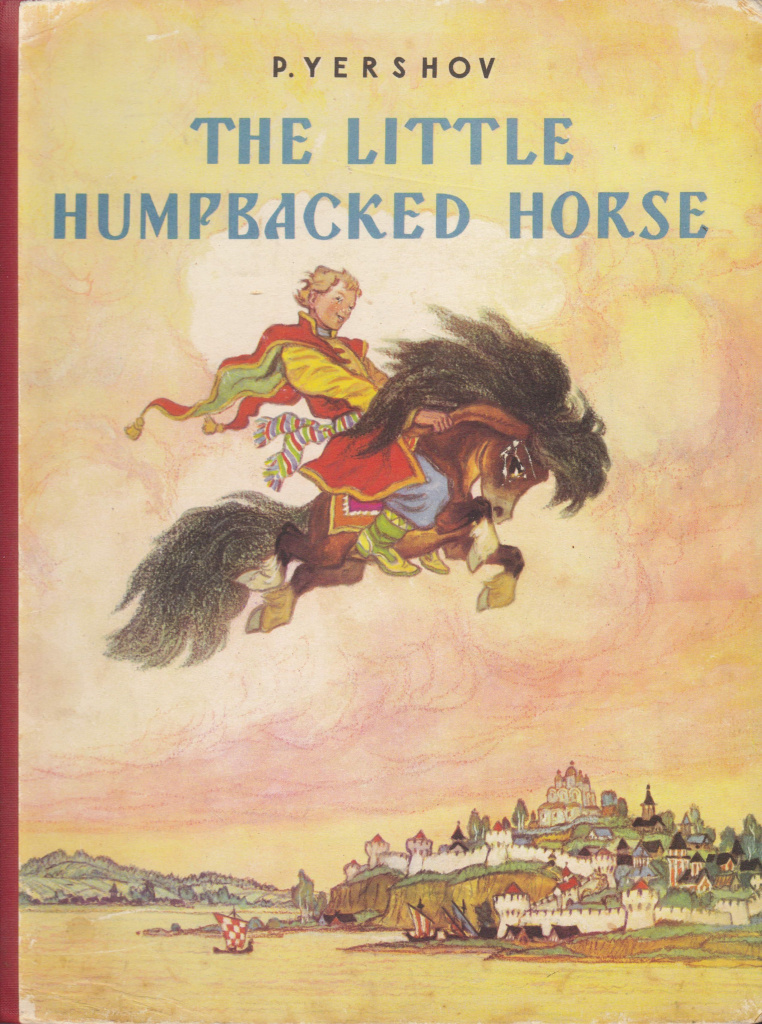
The Little Humpbacked Horse rides all the way to U.S.
/ Главная / Russkiy Mir Foundation / Publications / The Little Humpbacked Horse rides all the way to U.S.The Little Humpbacked Horse rides all the way to U.S.
Sergey Vinogradov

Alla Ranskaya. Photo by Gennady Kramor
The Little Humpbacked Horse will ride all the way to California: the famous poetic tale by Russian writer Pyotr Yershov to be published in English in the United States, following by the 190th anniversary of the fairytale. The project is launched by Alla Ranskaya, the writer's great-great-granddaughter and president of his foundation. Anna was born in Siberia just like her famous ancestor; she’s currently a San Francisco resident.
For the Humpbacked Horse it will not be the first trip abroad. Cartoons based on Ershov's fairy tale released in 20th century in the United States and Japan, are still popular. The work is also known for helping students learn Russian, as it has been published many times in books for bilinguals with a parallel placement of Russian and English verses.
Russian craftswomen in American book
The translation of The Humpbacked Horse, published in 1927 in London, is to be republished. The patchwork panels pictures made by Siberian palette creative Tyumen club are used to illustrate the modern vision of the fairytale.
Nine years ago, in preparation for the celebration of the 200th anniversary of Pyotr Ershov, a textile project “Pyotr Hunchback. A Patchwork Tale” was presented. Artisans from all over the world embroidered illustrations from the fairy tale. The results were amazing, 270 panels from 400 authors from 11 countries arrived to Tyumen. Arranged side by side, those panel could make a 135 meters spread. The exhibition traveled to many cities in Russia; Alla Ranskaya has organised an exhibit at the San Francisco Central Library. The exhibition was well received by visitors.
The best works to be included in a new edition of the book. 300 copies are to be printed. It is not planned to sell the books, but the copies to be sent to the main libraries in the United States, as well as in Moscow, Tobolsk, and Tyumen.
Grandmother's Stories
Alla Ranskaya was born in Irkutsk. As a child she heard a lot about Koyok-Gorbunok from her grandmother, the granddaughter of Peter Yershov. She often told Alla about her grandfather and family. According to her stories, she read about her ancestor's museum in the Pioneer"magazine, and started persuading her relatives to visit Tobolsk in Tyumen Oblast, but the family considered the trip too distant, and it never happened.

Alla Ranskaya at the Hunchback the Horse sculpture
Alla Ranskaya visited Tobolsk only at a mature age, when she has seriously engaged in the restoration of her family history. She gave part of her family documents to the Ishim Museum named after Pyotr Yershov, which was opened in 2006 in the writer's homeland.
Alla is also searching for information about her ancestors in San Francisco. She found out that among them were many important personalities, such as noble officers who played a bright role in the Russia’s history. Alla Ranskaya is currently working on a book that expands beyond Peter Yershov and his beloved characters.
The Irkutsk native from San Francisco has already published much of what she has found about her family's history on websites, social networks, collection of conference Paper Digests.
The Little Humpback Horse
The story was first translated into English in the 19th century as a part of a collection of fairy tales, shortly after the death of Peter Yershov.
The canonical translation was made by the famous Soviet translator Lev Zelikov, who has also translated to English-speaking readers Pushkin's tales. He worked hard to preserve Yershov's light rhyming syllable, similar to ditties. The book was published in 1954.
Of course, The Little Humpbacked Horse characters don’t speak just English. During Soviet times, the famous fairytale is translated in thirty languages, including Lezgin, Kumyk, Tabasaran and other languages.

The Magic Pony
The popularity of The Humpbacked Pony abroad was greatly influenced by its successful journey in the world of cinema. And today, in the perception of many Americans whose childhood fell in the 1970s and 1980s, a little horse carrying a smiling boy has become an integral symbol of Russian culture.
In the Soviet Union, in 1947, the animated film Konik Garbunok was released. It was directed by the animator, screenwriter, educator, professor at Gerasimov Institute of Cinematography of Soviet animation Ivan Ivanov-Vano. It was one of the first attempts in the USSR to create a full-length animated film.
The Humpbacked Pony was very well received in the USSR and brought international fame and awards to its creator, including Cannes. There is an evidence that Walt Disney himself, together with his colleagues, watched the animation multiple times, trying to understand how Soviet animators infused such vibrant life into their characters.
True global recognition came to the film almost 30 years later when a remade version was released on American screens under the title The Magic Pony. The film became a real breakthrough for Soviet animation. Serious efforts were made in the United States for the release of the movie, and Hollywood stars and television personalities were invited for voice-overs.
New publications

 Mikhail Kalatozov, a director who transformed the world of cinematography in many ways, was born 120 years ago. He was a Soviet film official and a propagandist. Above all, he was capable of producing movies that struck viewers with their power and poetic language.
Mikhail Kalatozov, a director who transformed the world of cinematography in many ways, was born 120 years ago. He was a Soviet film official and a propagandist. Above all, he was capable of producing movies that struck viewers with their power and poetic language.  Ukrainian authorities have launched a persecution campaign against the canonical Ukrainian Orthodox Church (UOC), the biggest one in the country's modern history. Over the past year, state sanctions were imposed on clergy representatives, searches were conducted in churches, clergymen were arrested, criminal cases were initiated, the activity of the UOC was banned in various regions of the country, and monasteries and churches were seized.
Ukrainian authorities have launched a persecution campaign against the canonical Ukrainian Orthodox Church (UOC), the biggest one in the country's modern history. Over the past year, state sanctions were imposed on clergy representatives, searches were conducted in churches, clergymen were arrested, criminal cases were initiated, the activity of the UOC was banned in various regions of the country, and monasteries and churches were seized.  When Nektary Kotlyaroff, a fourth-generation Russian Australian and founder of the Russian Orthodox Choir in Sydney, first visited Russia, the first person he spoke to was a cab driver at the airport. Having heard that Nektariy's ancestors left Russia more than 100 years ago, the driver was astonished, "How come you haven't forgotten the Russian language?" Nektary Kotlyaroff repeated his answer in an interview with the Russkiy Mir. His affinity to the Orthodox Church (many of his ancestors and relatives were priests) and the traditions of a large Russian family brought from Russia helped him to preserve the Russian language.
When Nektary Kotlyaroff, a fourth-generation Russian Australian and founder of the Russian Orthodox Choir in Sydney, first visited Russia, the first person he spoke to was a cab driver at the airport. Having heard that Nektariy's ancestors left Russia more than 100 years ago, the driver was astonished, "How come you haven't forgotten the Russian language?" Nektary Kotlyaroff repeated his answer in an interview with the Russkiy Mir. His affinity to the Orthodox Church (many of his ancestors and relatives were priests) and the traditions of a large Russian family brought from Russia helped him to preserve the Russian language.

 The leaders of the Friends of the Great Russia cultural association (Amici Della Grande Russia) in Italy believe that the Western policy of abolishing Russian culture in Europe has finally failed. Furthermore, it was doomed to failure from the beginning.
The leaders of the Friends of the Great Russia cultural association (Amici Della Grande Russia) in Italy believe that the Western policy of abolishing Russian culture in Europe has finally failed. Furthermore, it was doomed to failure from the beginning.  Name of Vladimir Nemirovich-Danchenko is inscribed in the history of Russian theater along with Konstantin Stanislavski, the other founding father of the Moscow Art Theater. Nevertheless, Mr. Nemirovich-Danchenko was a renowned writer, playwright, and theater teacher even before their famous meeting in the Slavic Bazaar restaurant. Furthermore, it was Mr. Nemirovich-Danchenko who came up with the idea of establishing a new "people's" theater believing that the theater could become a "department of public education."
Name of Vladimir Nemirovich-Danchenko is inscribed in the history of Russian theater along with Konstantin Stanislavski, the other founding father of the Moscow Art Theater. Nevertheless, Mr. Nemirovich-Danchenko was a renowned writer, playwright, and theater teacher even before their famous meeting in the Slavic Bazaar restaurant. Furthermore, it was Mr. Nemirovich-Danchenko who came up with the idea of establishing a new "people's" theater believing that the theater could become a "department of public education."  "Russia is a thing of which the intellect cannot conceive..." by Fyodor Tyutchev are famous among Russians at least. December marks the 220th anniversary of the poet's birth. Yet, he never considered poetry to be his life's mission and was preoccupied with matters of a global scale. Mr.Tyutchev fought his war focusing on relations between Russia and the West, the origins of mutual misunderstanding, and the origins of Russophobia. When you read his works today, it feels as though he saw things coming in a crystal ball...
"Russia is a thing of which the intellect cannot conceive..." by Fyodor Tyutchev are famous among Russians at least. December marks the 220th anniversary of the poet's birth. Yet, he never considered poetry to be his life's mission and was preoccupied with matters of a global scale. Mr.Tyutchev fought his war focusing on relations between Russia and the West, the origins of mutual misunderstanding, and the origins of Russophobia. When you read his works today, it feels as though he saw things coming in a crystal ball...